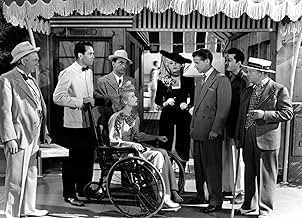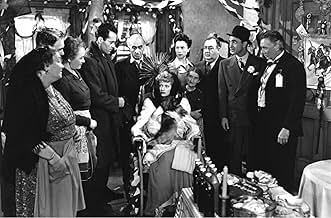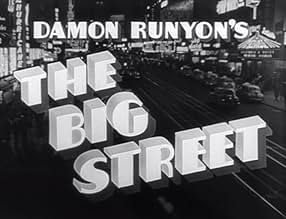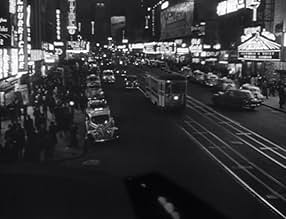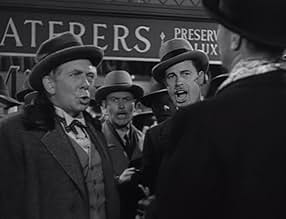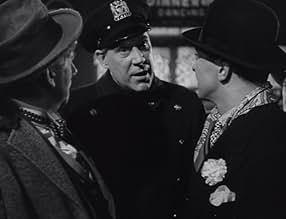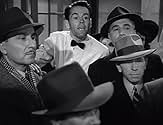IMDb-BEWERTUNG
6,4/10
1761
IHRE BEWERTUNG
Ein Hilfskellner, der unerwidert in eine Nachtclubkünstlerin verliebt ist, kommt ihr näher, nachdem sie bei einem Angriff ihres Gangsterfreundes gelähmt wurde.Ein Hilfskellner, der unerwidert in eine Nachtclubkünstlerin verliebt ist, kommt ihr näher, nachdem sie bei einem Angriff ihres Gangsterfreundes gelähmt wurde.Ein Hilfskellner, der unerwidert in eine Nachtclubkünstlerin verliebt ist, kommt ihr näher, nachdem sie bei einem Angriff ihres Gangsterfreundes gelähmt wurde.
- Regie
- Drehbuch
- Hauptbesetzung
- Auszeichnungen
- 2 wins total
William T. Orr
- Decatur Reed
- (as William Orr)
Don Barclay
- Eating Contest Emcee
- (Nicht genannt)
Mary Bayless
- Nightclub Patron
- (Nicht genannt)
Louise Beavers
- Ruby - Gloria's Maid
- (Nicht genannt)
Anthony Blair
- O'Rourke
- (Nicht genannt)
Empfohlene Bewertungen
The Big Street (1942)
Packed with great actors, major and minor, in a fast fast whirlwind
First of all, Agnes Moorehead and Ray Collins played the previous year in another raging movie of some fame (Citizen Kane, yup), and here they are loaded up against a dozen other great character actors, plus a couple big names. Headlining is the well known Henry Fonda, still young, but fresh off of a couple great films, Grapes of Wrath (1940), and The Young Mr. Lincoln (1939). But in a kind of startling role for those who know Lucille Ball as a brilliant and goofy t.v. comedian a decade later, we have her here as a big-eyed femme fatale, or would-be femme fatale until fate takes a turn.
You might think this one is a screwball comedy the way it starts, but keep watching-- there is violence and trauma soon enough, and the movie takes a turn that Fonda is worthy of. There is a Frank Capra feel-good element amidst the hardship, but it is full of verve, and all these odd characters who really are (were and are) what New York is at its best. The director Irving Reis (with photographer Russell Metty) keeps the scenes snappy, and sometimes moves from a closeup of a face to a background quickly, to let a character make a dramatic point. There are lots of movie tricks, quick fades from scene to scene to show the passing of time, and some tacky back projection, and it really goes along with the fairy tale narrative.
And there really is an unbelievable ending, which you have to take with the whole flavor of the movie, a kind of sincerity/fantasy mixture.
Packed with great actors, major and minor, in a fast fast whirlwind
First of all, Agnes Moorehead and Ray Collins played the previous year in another raging movie of some fame (Citizen Kane, yup), and here they are loaded up against a dozen other great character actors, plus a couple big names. Headlining is the well known Henry Fonda, still young, but fresh off of a couple great films, Grapes of Wrath (1940), and The Young Mr. Lincoln (1939). But in a kind of startling role for those who know Lucille Ball as a brilliant and goofy t.v. comedian a decade later, we have her here as a big-eyed femme fatale, or would-be femme fatale until fate takes a turn.
You might think this one is a screwball comedy the way it starts, but keep watching-- there is violence and trauma soon enough, and the movie takes a turn that Fonda is worthy of. There is a Frank Capra feel-good element amidst the hardship, but it is full of verve, and all these odd characters who really are (were and are) what New York is at its best. The director Irving Reis (with photographer Russell Metty) keeps the scenes snappy, and sometimes moves from a closeup of a face to a background quickly, to let a character make a dramatic point. There are lots of movie tricks, quick fades from scene to scene to show the passing of time, and some tacky back projection, and it really goes along with the fairy tale narrative.
And there really is an unbelievable ending, which you have to take with the whole flavor of the movie, a kind of sincerity/fantasy mixture.
"The Big Street" was not a major hit when first released but the critics at the time all noted Lucille Ball's superb star-making performance as one of the all-time nastiest women ever to reach the big screen. Lucy was already a minor star thanks to a string of popular B-grade comedies and dramas but this film cemented her stardom and brought her to MGM where she reached an early peak the next year. The film is sentimental and does have some plot points that have to be swallowed but Ball's great acting and chemistry with a splendid Fonda makes this tale of unrequited love work. Fonda plays a kind innocent busboy who falls madly in-love with a crippled chanteuse(Ball). The last scene on the dance floor is unforgettable. Why RKO did not get Lucy an Oscar nomination for this performance is a crime. All the critics at the time hailed her work in this but it just slipped under the rug when the film posted only small profits. This was the kind of role Bette Davis made her own but Ball does it without Davis' habit of falling into mannerisms. Agnes Moorehead is also excellent as Fonda's concerned friend. Beautiful cinematography makes Ball look incredible in her close-ups. Worth a look but overlook the occasional mawkish elements. Lucy makes it a must.
Anyone who has the slightest desire to learn more about the incredible talent of Lucille Ball and Henry Fonda owes it to themselves to see this marvelous movie. Over the years, these two stars built up such powerful images of themselves as star characters, and most of the public came to know them as a result of the cumulative impressions which they made on our individual consciousness. Your strong impression of Lucille Ball is as a comedian, correct? You seldom if ever think of her as a dramatic actress. Can you imagine Lucille Ball playing a role of a vain self-centered and arrogant harridan who seems to live for the sole purpose of tormenting the lowly busboy who is her one true friend in all the world? Few people can imagine Lucy in such a role, but if you watch this movie, you will see it happen. It is also totally believable because, even though Lucy worked primarily as a comedian, she was a great dramatic actress when she chose to accept a role of that type. As for Henry Fonda, who could even conceive of casting this great actor as a busboy? It was early in his career and he is playing a role of the type that he would never have to play again, but he pulls it off. You wonder at times why he is taking so much abuse from this woman. But the answer is incredibly simple. He deeply loves the woman, and his love comes shining through. If you want to see two great stars at work in the early days of their careers, check out this movie.
Broadway busboy Henry Fonda (as Agustus "Little Pinks" Pinkerton) idolizes self-centered lounge singer Lucille Ball (as Gloria "Your Highness" Lyons). When Ms. Ball falls on hard times, Mr. Fonda gets to lend a helping hand. The pair move to Florida, but tragedy follows
Although "Guys and Dolls" (1955) remains most representative, "The Big Street" captures the spirit of writer Damon Runyon's characters better than most Hollywood efforts, probably because Mr. Runyon produced.
They weren't the author's first choice for the leads, but Fonda's innocent charmer and Ball's selfish tragedienne are exemplary characterizations. Ball is especially noteworthy, as she did not receive many opportunities to play against type, and places herself squarely on par with the more successful "Golden Age:" actresses of the 1930s and 1940s; she is startling. Director Irving Reis coordinates his fine cast and crew very well, making camera angles and movement seem uncommonly fresh.
******** The Big Street (8/13/42) Damon Runyon : Irving Reis ~ Lucille Ball, Henry Fonda, Agnes Moorehead, Eugene Palette
They weren't the author's first choice for the leads, but Fonda's innocent charmer and Ball's selfish tragedienne are exemplary characterizations. Ball is especially noteworthy, as she did not receive many opportunities to play against type, and places herself squarely on par with the more successful "Golden Age:" actresses of the 1930s and 1940s; she is startling. Director Irving Reis coordinates his fine cast and crew very well, making camera angles and movement seem uncommonly fresh.
******** The Big Street (8/13/42) Damon Runyon : Irving Reis ~ Lucille Ball, Henry Fonda, Agnes Moorehead, Eugene Palette
Years before Damon Runyon got Broadway and screen immortality with Guys and Dolls, one of his short stories was adapted for the silver screen concerning the unrequited love of a bus boy for a Broadway entertainer. That story was The Big Street and the title is named for the street that Runyon chronicled, Broadway.
Though The Big Street got good reviews for its stars Henry Fonda and Lucille Ball, the subject matter was way too much of a downer for mass audience appeal. The plot as it is tells the story of Little Pinks who is madly in love with this nightclub entertainer who being the mistress of gangster Barton MacLane, can't see him for beans and wouldn't look up from the table to try.
That all changes when MacLane slaps her so hard she falls down a flight of stairs and becomes paralyzed. All abandon her then and in truth she didn't exactly near and endear herself to too many. That is except for Fonda and the Broadway characters he lines up to give her a helping hand.
A movie like The Big Street could not be made today because we don't have the rich assortment of character players to entertain us. The people Damon Runyon created were made for such performers as Sam Levene, Ray Collins, Millard Mitchell, etc. And of course the two best performers who steal the film from the leads when they're on are Agnes Moorehead and Eugene Palette. Moorehead didn't do too much comedy and her gift for it would not be tapped again until she was Endora in Bewitched.
Lady for a Day and Guys and Dolls enjoyed much greater success because they were done in a comic vein. My guess is that is what people expect when they see Damon Runyon on a theater program credit.
Still The Big Street is nicely-nicely done as Eugene Palette and Stubby Kaye would say.
Though The Big Street got good reviews for its stars Henry Fonda and Lucille Ball, the subject matter was way too much of a downer for mass audience appeal. The plot as it is tells the story of Little Pinks who is madly in love with this nightclub entertainer who being the mistress of gangster Barton MacLane, can't see him for beans and wouldn't look up from the table to try.
That all changes when MacLane slaps her so hard she falls down a flight of stairs and becomes paralyzed. All abandon her then and in truth she didn't exactly near and endear herself to too many. That is except for Fonda and the Broadway characters he lines up to give her a helping hand.
A movie like The Big Street could not be made today because we don't have the rich assortment of character players to entertain us. The people Damon Runyon created were made for such performers as Sam Levene, Ray Collins, Millard Mitchell, etc. And of course the two best performers who steal the film from the leads when they're on are Agnes Moorehead and Eugene Palette. Moorehead didn't do too much comedy and her gift for it would not be tapped again until she was Endora in Bewitched.
Lady for a Day and Guys and Dolls enjoyed much greater success because they were done in a comic vein. My guess is that is what people expect when they see Damon Runyon on a theater program credit.
Still The Big Street is nicely-nicely done as Eugene Palette and Stubby Kaye would say.
Wusstest du schon
- WissenswertesLucille Ball's favorite of her films. She felt her performance was unjustly ignored by the Academy of Motion Picture Arts and Sciences (AMPAS).
- PatzerA gathering to raise money to send Gloria Lyons to Florida doesn't raise enough, so a suggestion is made to put it on a horse. A face-on shot of Horsethief shows him sitting down and pulling a paper from his inside pocket. He stands up and unfolds the paper, but then a long shot shows him just starting to take the paper from his pocket.
- Zitate
Gloria Lyons: Love is something that gets you one room, two chins and 3 kids.
- Crazy CreditsOpening credits: "Loser's Lane --- the sidewalk in front of Mindy's Restaurant on Broadway-- is not as high-toned a trading center as Wall Street, but the brokers are a lot more colorful. Generally they prefer to put their money on a prizefight or horserace, but when the action slows, anything can happen and it usually does. Tonight, for example, the citizens of the Lane are discussing the latest contest in their usual quiet way --"
- VerbindungenFeatured in Salut für ...: Salut für Henry Fonda (1978)
- SoundtracksWho Knows?
(1942)
Lyrics by Mort Greene
Music by Harry Revel
Performed by Lucille Ball at the New York nightclub (uncredited)
Reprised by her with Ozzie Nelson and Orchestra at the Florida nightclub (Vocals for Miss Ball by Martha Mears) (uncredited)
Played often in the score
Top-Auswahl
Melde dich zum Bewerten an und greife auf die Watchlist für personalisierte Empfehlungen zu.
- How long is The Big Street?Powered by Alexa
Details
- Erscheinungsdatum
- Herkunftsland
- Sprache
- Auch bekannt als
- Damon Runyon's The Big Street
- Drehorte
- Miami, Florida, USA(second unit - exteriors)
- Produktionsfirma
- Weitere beteiligte Unternehmen bei IMDbPro anzeigen
- Laufzeit
- 1 Std. 28 Min.(88 min)
- Farbe
- Seitenverhältnis
- 1.37 : 1
Zu dieser Seite beitragen
Bearbeitung vorschlagen oder fehlenden Inhalt hinzufügen


